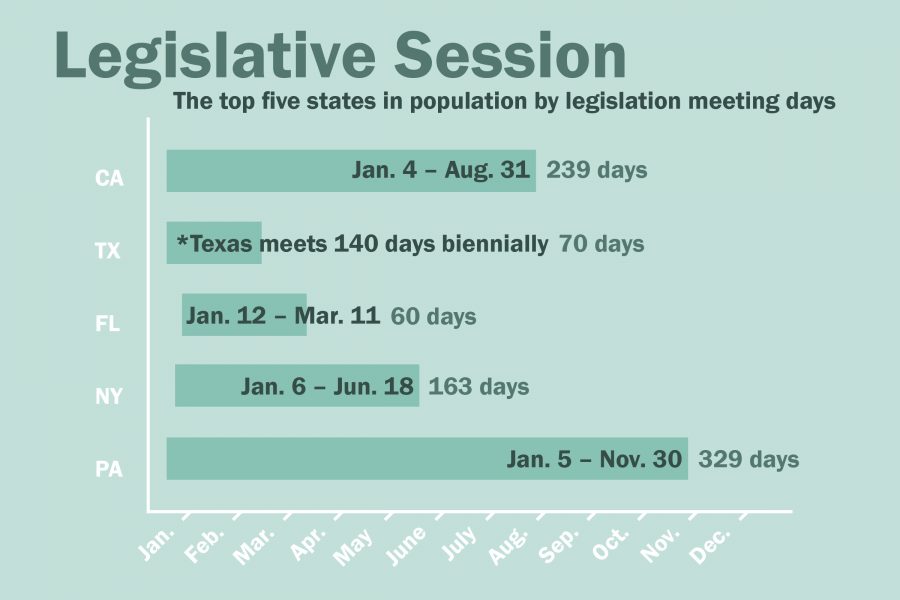If someone from outside of Texas asked you to name some Texas traditions, what would you say? The foodie might name our world-renowned barbecue joints. The politico might rattle off some facts about hyper-conservative politics in the state. I would bet that only a select few state legislators would offer up our unique legislative schedule of 140 days every two years, despite being in the Texas constitution since 1876. However, just because it’s traditional does not mean it should be exempt from criticism.
The part-time legislature in Texas falls in the category of non-professional legislatures, as our elected officials neither work all year nor receive full-time pay, or so I thought until I stumbled across a Dallas Morning News article on the not-so-part-time work schedule of our lawmakers. According to the Morning News, simply running a state makes for an intense job, let alone lawmaking in just 140 days — as it turns out, lawmaking is not limited just because you limit a lawmaking session. This is evident in the frequent 30-day special legislative sessions called by Texas governors. Former Gov. Rick Perry alone called 12 in 14 years!
This raises an important question: If the Legislature is already working a nearly full-time schedule, why not just make it official? Research shows that professional legislatures are more efficient and representative than part-time. Citizens in states with full-time legislatures, in short, are better represented than those with part-time legislators — even those in Texas where lawmakers work longer-than-average hours. Perhaps this increase is an effect of legislators thinking of themselves a policymakers instead of citizen-lawmakers, or perhaps still it is simply the more formal schedule. Whatever it is, Texans would likely be better off with full-time, or “professionalized”, elected officials.
To be fair, the research linked above is just that of a Ph.D. dissertation — some would prefer some more formalized research. To avoid that critique, I offer the following.
Research from the infamous political science book “Statehouse Democracy” noticed this phenomenon as early as the 1990s. In the book, its authors Robert Erikson, Gerald C. Wright and John P. McIver find that legislators in some Southern states — often the ones with part-time lawmaking — vote for the public’s preferred policy less often than other legislatures in America.
If a boost in efficiency and representation to our legislature is not enough to sell you on a professionalization of our Capitol, there are fiscal matters that also deserve our attention. If what the Morning News found is true, then our lawmakers are almost certainly underpaid for the time they are putting into running our state.
Paying our legislators a proper salary could encourage more qualified professionals to join ranks with lawmakers — at the very least, it would encourage Texans to run for office who aren’t already rich. Increasing the time our leaders spend in Austin would undoubtedly justify the raise in salary they absolutely deserve.
It’s past time that Texans receive the Legislature they deserve: a well-funded, year-round body of lawmakers who are properly equipped to lead our great state. If we want our laws to be representative and deliberated in an efficient manner, professionalization is the next logical step.
G. Elliott Morris is a government, history and computer science junior. He is a senior columnist. Follow him on Twitter @gelliotmorris.





















